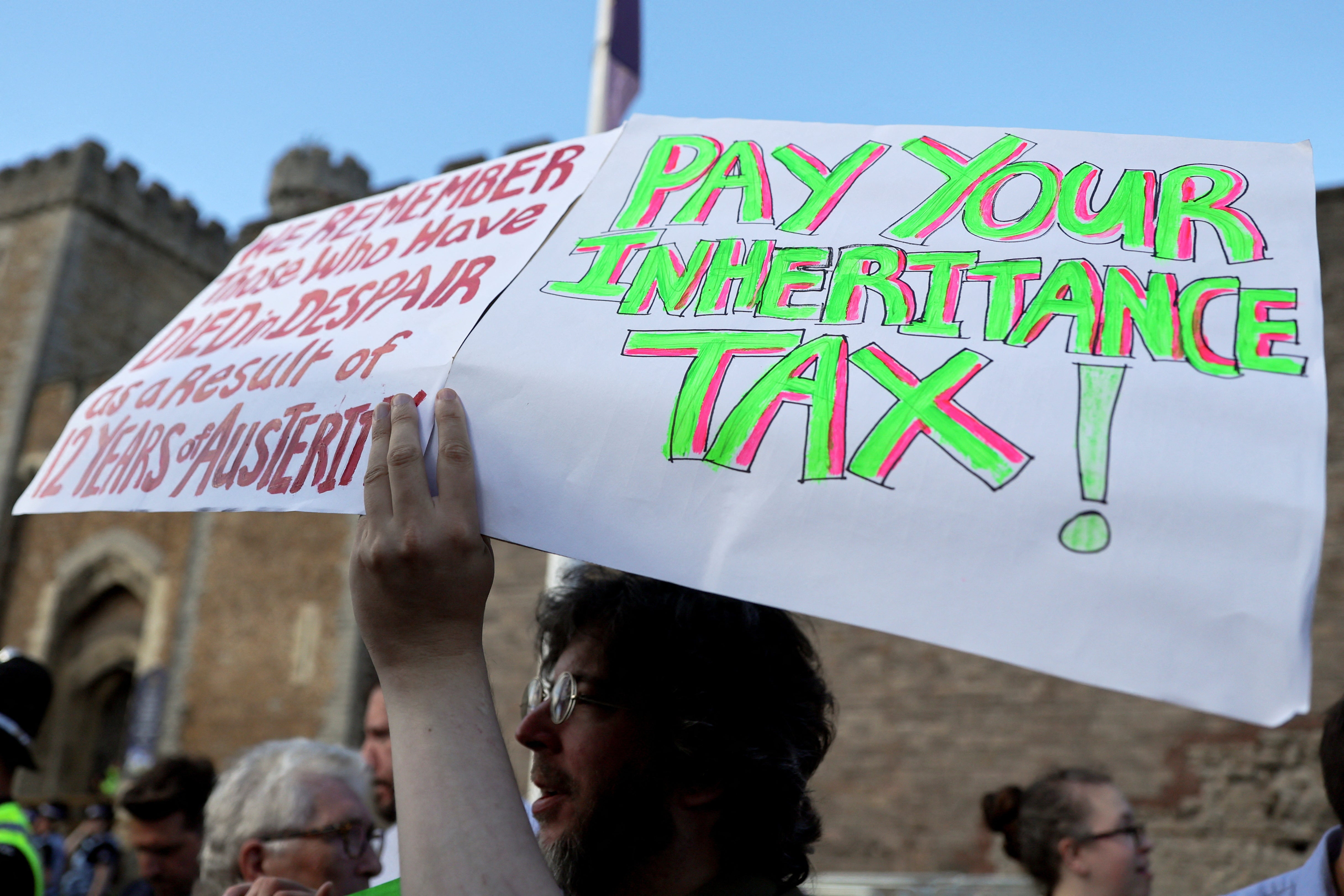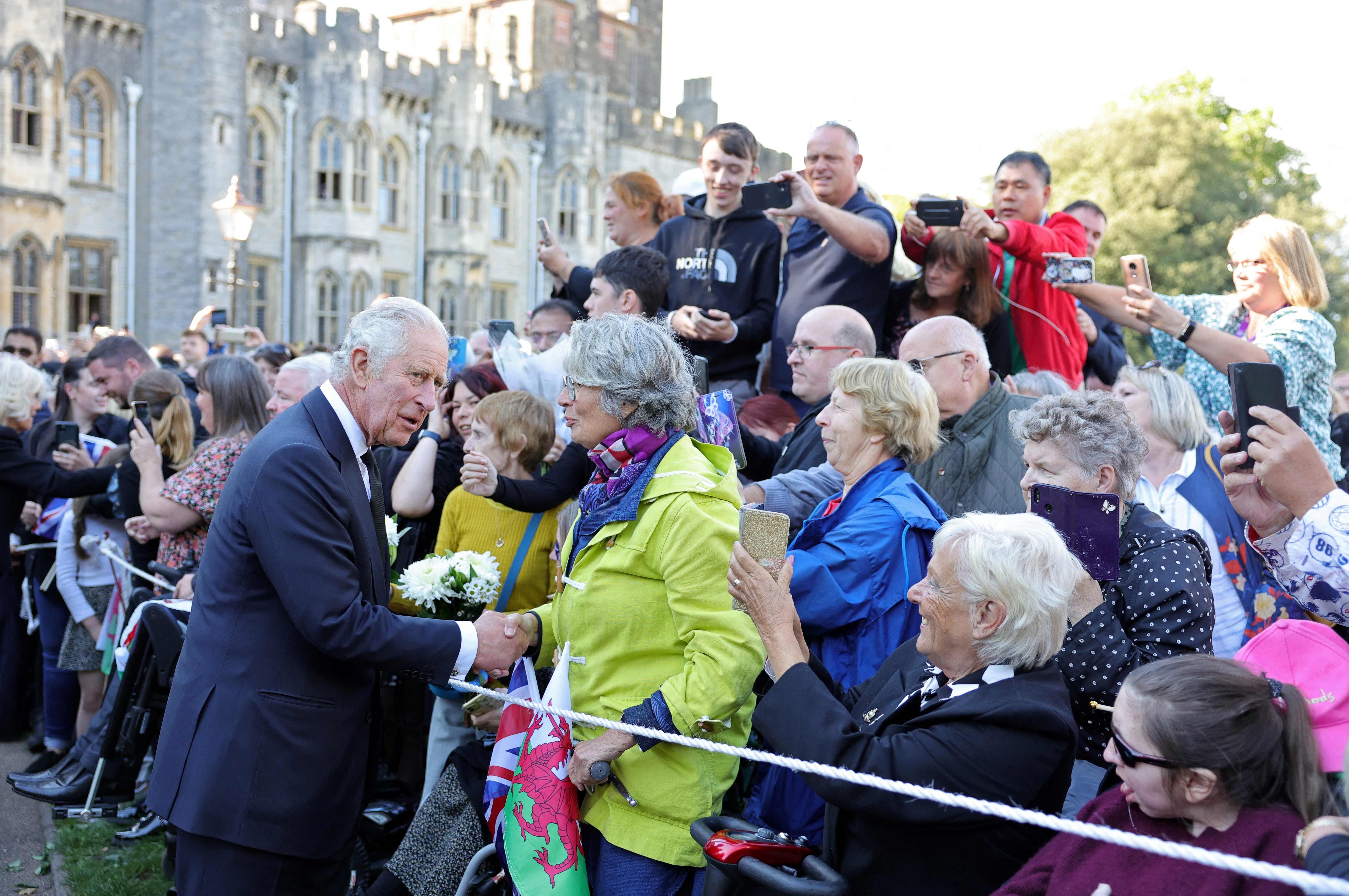Anti-monarchy protesters boo King Charles as he greets cheering crowd at Cardiff Castle
New sovereign’s first visit to Wales as monarch coincides with Owain Glyndwr Day
Your support helps us to tell the story
From reproductive rights to climate change to Big Tech, The Independent is on the ground when the story is developing. Whether it's investigating the financials of Elon Musk's pro-Trump PAC or producing our latest documentary, 'The A Word', which shines a light on the American women fighting for reproductive rights, we know how important it is to parse out the facts from the messaging.
At such a critical moment in US history, we need reporters on the ground. Your donation allows us to keep sending journalists to speak to both sides of the story.
The Independent is trusted by Americans across the entire political spectrum. And unlike many other quality news outlets, we choose not to lock Americans out of our reporting and analysis with paywalls. We believe quality journalism should be available to everyone, paid for by those who can afford it.
Your support makes all the difference.Booing could be heard among the wave of cheers as King Charles III approached Cardiff Castle during his first visit to Wales as monarch.
Despite being intended as a silent demonstration by a number of groups under the banner Real Democracy Now, a small number of anti-monarchy protesters could be heard voicing their discontent as the King and Queen Consort arrived at the castle by motorcade on Friday, with one shouting: “God save the people.”
Around 40 protesters stood amid the sea of union jacks and Welsh flags held up to welcome King Charles, some brandishing placards reading, “We want a democracy, a Welsh republic” and “Abolish the Monarchy”. At points, the rally broke into song led by members of the socialist choir Cor Cochion.
It is the first notable sign of anti-monarchy sentiment that the King has encountered during his tour of the devolved nations in his first days as sovereign, and his visit to Cardiff also happened to fall on the day celebrating the rebel Owain Glyndwr – who is considered to be the last native-Welsh Prince of Wales.
Charles, whose own 64-year grip on the title came to an end last week with the death of his mother, Queen Elizabeth II, had travelled to Cardiff Cathedral from the Senedd, where he gave his first address to members of the Welsh parliament at a remembrance event.
Having been taught Welsh at the University College of Wales at Aberystwyth in 1969, the King spoke bilingually as he recalled that his late mother had been devoted to the country, adding: “I take up my new duties with immense gratitude for the privilege of having been able to serve as Prince of Wales.
“That ancient title dating from the time of those great Welsh rulers like Llywelyn ap Gruffudd, whose memory is still rightly honoured, I now pass to my son William, whose love for this corner of the Earth is made all the greater by the years he himself has spent here.”
Schoolchildren were among the hundreds who waited outside the parliament building ahead of their arrival, waving Wales flags and chanting “We want the King”.

After entering the building, the King and Queen Consort were greeted by a fanfare from the trumpeters from the band of The Royal Welsh, with harpists playing as they moved towards the debating chamber.
Upon their return outside, however, Charles and Camilla were met with boos from Welsh nationalist protesters, who held up signs with the name of Owain Glyndwr. But these were reportedly drowned out quickly by the sound of people singing “God Save the King”, and the new monarch was undeterred in walking over to the crowd to greet well-wishers.
It was on 16 September in the year 1400 when Glyndwyr began a 15-year uprising against the king of England, Henry IV, in a revolt considered the last Welsh war of independence.
Proclaimed by his followers as the Prince of Wales, Glyndwyr has since been viewed as a figurehead of Welsh nationalism and the independence movement, with thousands celebrating his life and legacy each year on 16 September.
But following the Queen’s death last Thursday at the age of 96, a number of Glyndwr Day events have been cancelled, prompting some anger.
Despite the protests, the reception for King Charles and Camilla in Wales was largely positive.

Earlier in the day, the atmosphere had also been welcoming around Llandaff Cathedral where the King and Queen Consort attended a memorial service for the late Queen, led by the Archbishop of Wales.
But while members of the public chanted “God save the King” and showered the couple with flowers and gifts, a lone male voice at one point shouted over the crowd: “We pay £100m a year for you, and for what?”
With police forces having been criticised in recent days over their handling of anti-monarchy protesters, Welsh first minister Mark Drakeford had emphasised ahead of the royal visit that “people have a legitimate right to protest”.
“People have that right and I think it will be exercised with restraint and it will be a footnote to the dominant feelings of the day,” Mr Drakeford said.
Campaigners have said they want the Welsh public to consider whether a future without the monarchy is possible, and a petition calling for the end of the use of the Prince of Wales title by the British monarchy has gathered almost 30,000 signatures in a week.
Opinion polls taken in 2009 and 2018 both suggested that significantly more than 50 per cent of people in Wales favoured there being another Prince of Wales after Charles.
However, a more recent poll in June 2022, conducted by YouGov, found that just 46 per cent of respondents thought there should be another Prince of Wales, compared with 31 per cent who did not.
Mr Drakeford also warned that Prince William should not be crowned Prince of Wales with a lavish ceremony as seen in the past, such as with Prince Charles’s investiture at Caernarfon Castle in 1969.
That event was marred by bombings by the Welsh paramilitary group Mudiad Amddiffyn Cymru.
“The Wales of 2022 is very different to the Wales of 1969,” he said. “I don’t think looking back at that event and thinking of it as some sort of pattern that you would wish to pick up and copy, I don’t think that would be the right way to go about things.”
Join our commenting forum
Join thought-provoking conversations, follow other Independent readers and see their replies
Comments